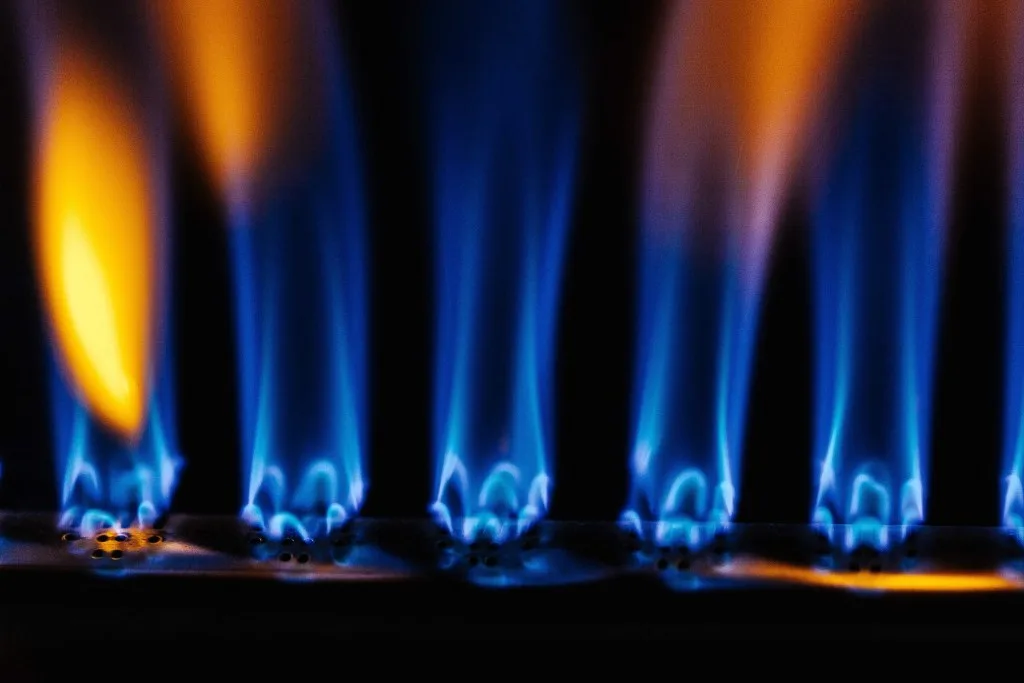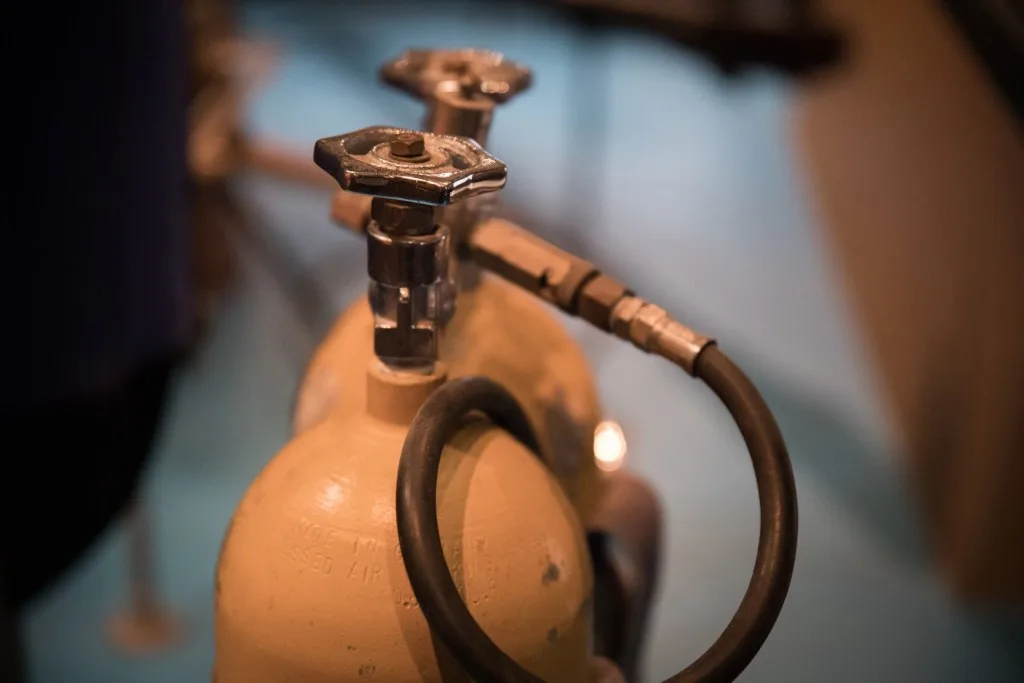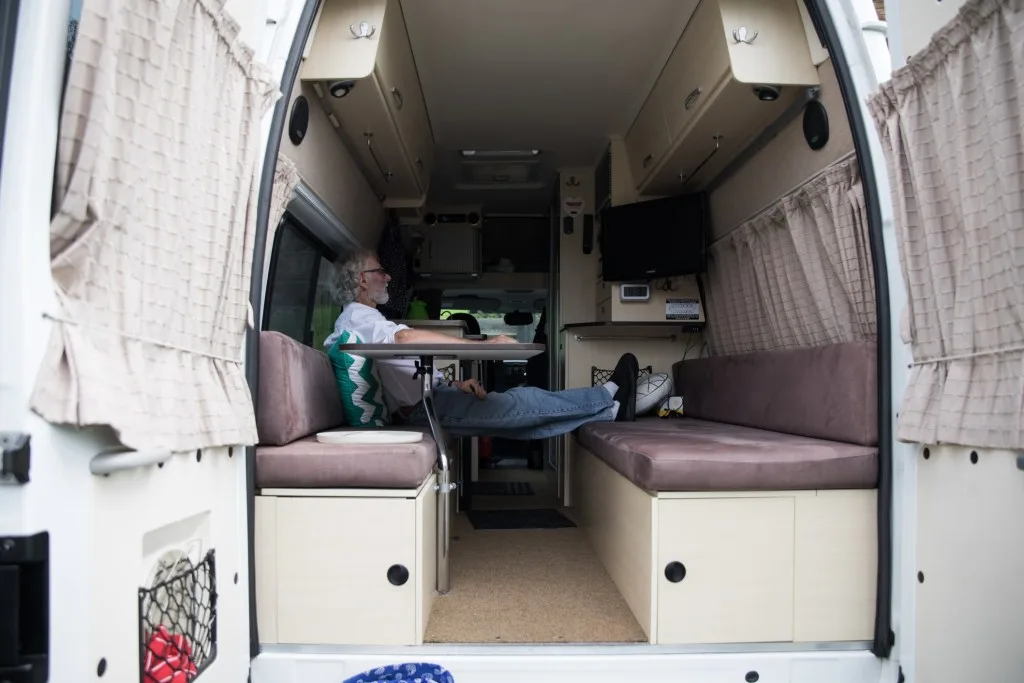When is RV Propane Dangerous?
Propane fuel is a handy tool in an RV, but it can be dangerous if handled or stored improperly.
Today, we’ll take a look at the various ways propane could make you and your family sick or worse.
Let’s jump in!
What is Propane?
Liquified Petroleum Gas (LPG), better known as propane, is a highly flammable fossil fuel. That said, it’s relatively safe when it’s used and stored properly.
RVers most often use propane for running their refrigerator, cooking meals, and heating via their furnace. Campers and backyard grillers may also use it in those little green canisters for their barbecues or camp stoves.
At normal air pressure, propane is a gas. However, companies place the gas under pressure to force it into its liquid state for easier storage, transport, and filling. Because of this, a few gallons of liquid can provide months of fuel, depending on how you use it.

The Dangers of Propane
Inhaled Gas
There’s a reason RVs have propane and carbon monoxide detectors – both gasses are dangerous. If you inhale propane gas, such as from a leak, you might experience dizziness, nausea, cough, and skin irritation at a minimum. Longer exposure leads to pain and numbness, irregular heartbeat, and weakness.
Because propane gas is heavier than oxygen, it can actually displace it in the air. Unless your detector goes off when you’re sleeping, you’ll continue to breathe in the propane without realizing it. Intense or prolonged exposure can cause suffocation, stroke, coma, or death.
Carbon monoxide (CO) gas is produced if you’re inefficiently burning propane. One way to tell if this is happening is if your cooktop’s flame is more yellow or orange than blue. The normal flame might have some yellow in it, but when there’s a lot, it’s time to take a look.
Possible causes are a failing regulator or clogged holes from grease and food where the gas comes out. As with propane gas, be sure you have a good, working CO detector.

Spilled Liquid
Propane under pressure has a very low temperature. Just feel the bottom of any propane tank, and you’ll understand. Because of the low temperature, RV propane in its liquid form can be very dangerous, causing any surface it touches to drop 44 degrees in just a few seconds.
If this happens to your skin, it essentially causes frostbite. A minor light splash removed quickly might cause some blistering. However, a larger spill or one left on your skin longer could be much more serious. Seek medical attention immediately.
Explosion and Fire
As we mentioned above, propane is also dangerous because it’s highly flammable. Even the smallest spark, such as from turning on a light or plugging something in, can cause fire or an explosion if the gas is present.
There’s also the danger of being in an accident while driving. If you’re hit, and you have a leak or left your propane tank valve open, it could mean losing your RV and everything in it within seconds.
Pro Tip: Do you have an RV fridge? Here are some alternate tips for keeping it cool, so you can stay safe and shut your propane off while driving.

Reduce the Danger with Regular Propane System Maintenance
Regular RV propane system checks and maintenance go a long way toward reducing the dangers. You’ll want to ensure your detectors are working, have healthy batteries, and haven’t become outdated. It’s generally suggested they be completely replaced about every seven years.
Then, visually inspect the tank, regulator, and any other metal parts for rust or other damage. Rust can reduce the effectiveness of your tank and lead to a rupture. Next, check your water heater, refrigerator, and heater vents for debris or nests. It’s important to keep these areas clear to prevent the gas from backing up into your RV.
Also, check the valves and any pipes or tubing for leaks with a portable gas sniffer or the bubbles method. Add dish soap and a little water to a spray bottle and shake. Spray the solution at the valves or where you think there might be a leak. If the soap bubbles, you have a leak.
If you have portable propane tanks, such as in a towable RV, seat them properly to avoid broken pipes or connectors.
Lastly, we suggest having a professional check the entire system once a year.
What to Do If You Find a Leak
If you find a leak, especially even if a tiny amount of gas could be getting into your RV, get everyone out. If possible, turn off any open flames, such as your cooktop, and shut the propane tank valve.
Do not turn on or off any switches or plug or unplug any electronics. Open the windows and doors, if it’s not dangerous, to air the propane out of your RV.

Call a professional to repair the problem or 911 if the situation is an emergency. You may need to consider another place to stay until you can fix the leak. However, it may be possible to stay in your RV if you can keep the propane shut off and the leak isn’t coming from the tank.
Keep in Mind: While propane is dangerous, it also has its benefits. Learn more about How to Convert your Gas Generator to Propane.
RV Propane is Always Dangerous
You should always consider your RV’s propane system to be a possible danger. On the other hand, it’s a beneficial fuel if you treat it with respect and keep up with proper maintenance. Have you ever had a propane leak in your RV?
Discover the Best Free Camping Across the USA
To be honest with you, we hate paying for camping. There are so many free campsites in America (with complete privacy).
You should give it a try!
As a matter of fact, these free campsites are yours. Every time you pay federal taxes, you’re contributing to these lands.
Become a FREE CAMPING INSIDER and join the 100,000 campers who love to score the best site!
We’ll send you the 50 Best Free Campsites in the USA (one per state). Access the list by submitting your email below:
Propane in a tank,not being used,and of course confined in a tank will be a liquid and will be the temperature of ambient air plus other heat from other sources such as the suns heat.the temperature of the propane and its tank will drop as you use the propane gas for heating etc. This is caused by the evaporation of the liquid propane to a gas inside the tank since the temperature of vaporization is the minus 42 to 44 degrees you talked about. When you touch the bottom of the tank it will feel cold because the vaporizing process drops the temperature of the liquid and thus the tank. Also have you checked out the WAVE catalytic heaters? Expensive but quite effective. Sorry about the extensive discussion on propane but as a balloon pilot my life has depended on knowing a little bit about propane about 50 years!